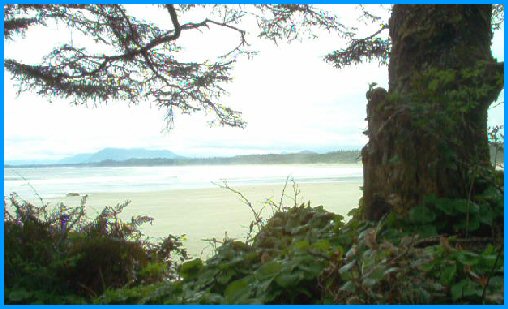|
Prose
Muting the Rainforest Discourses
by Elmer G. Wiens
In The Intemperate Rainforest: Nature, Culture, and Power on Canada's West Coast, Bruce Braun states that British Columbia's "rainforest is a contested domain, where epistemology and politics are not separate" (3). Political processes shape the knowledge society accepts about the rainforest. Knowledge processes construct society's understanding of the rainforest, and society's acceptance of political decisions that determine the rainforests' future. The struggle for British Columbia's rainforests took a dramatic turn on April 13, 1993 when the provincial government gave forest companies permission to clear-cut the rainforests of Clayoquot Sound of Vancouver Island. During the next seven months, environmental protestors blocked MacMillan Bloedel's logging roads (69). When the Royal Canadian Mounted Police arrested these demonstrators, the media turned a local matter into an international incident, with potentially adverse political consequences for the New Democratic Party (NDP) government.
Braun alleges that this "war in the woods" was the "logical outcome" of the system of sustained-yield forestry prevailing in the forest industry (66). Theoretically, this framework provides a perpetual volume of timber for manufacture into products, along with stable jobs in established communities throughout the province (68). After loggers cut the timber in a region, foresters planted new trees. When loggers eventually harvest the timber in the remotest areas of the province, the second-growth forests would be ready. Thirty years after the government introduced "scientific management" of forests, environmentalist's concern for the unscathed rainforests of Clayoquot Sound clashed stridently with the industry's demand for timber. After simmering for a decade, this dispute came to a clamorous head when "the provincial government unilaterally imposed its land-use plan in 1993" (69).
 |
Because of its professed empathy with environmentalists' causes, the NDP government's decision to log Clayoquot surprised many political pundits and NDP supporters. Why were they implementing a policy that former Social Credit Premier William Vander Zalm abandoned when Clayoquot Sound residents opposed clear-cut logging? Environmental organizations such as Greenpeace and the Western Canada Wilderness Committee mounted international information campaigns resulting in European and U.S.A. boycotts of MacMillan Bloedel's products. The NDP government countered environmental criticism by attempting to influence public perceptions about its decision. Perhaps anticipating adverse reactions to its decision to log Clayoquot Sound, the NDP had established the Commission on Resources and Environment (CORE) in 1992 to develop a land and resource use strategy with the objective of reducing the conflict between "workers, environmentalists, industry, communities, First Nations, and all levels of government" (Owen). In 1993 the NDP also established a Scientific Panel to search for a solution to logging in Clayoquot Sound that recognized the interests of the Nuu-chah-nulth Nation and developed better logging standards. The Panel's 1995 report emphasised the importance of protecting the ecosystem rather than the employment benefits from logging.
With these moves the NDP authorized "certain actors" to shape the forest discourses, while maintaining the political support of the International Woodworker Alliance (IWA) who favoured logging Clayoquot Sound (Braun 33). By successfully muting the discourses, the New Democratic Party survived the controversy they initiated, and narrowly won the British Columbia general election of 1996. Subsequent developments further legitimized logging Clayoquot Sound's rainforests. In 1998, MacMillan Bloedel and the local First Nations created Iisaak Forest Resources as a joint venture. This forest company, which began logging in 2000 using "a conservation-based approach to forestry," has the support of Greenpeace Canada, Greenpeace International, the Natural Resources Defense Council, the Sierra Club of British Columbia, and the Western Canada Wilderness Committee (Iisaak).
The political lessons learned in Clayoquot Sound transferred to the war to save the "Great Bear Rainforests" stretching from Knight Inlet to Alaska. In "'Great Bear' Basks in Peace," Gordon Hamilton describes the decade-long battle leading to the historic land use agreement between the provincial government and coastal First Nations signed on February 7, 2006. Environmental groups vigorously promoted the region as the habitat of the grizzly and white "Spirit" bear and the home of First Nation communities. Furthermore, they induced boycotts by Home Depot and a number of German publishers that threatened to cripple the coastal forest industry. During the 2001 provincial election campaign, the NDP announced a proposed agreement between industry and eco-groups that protects watersheds and focuses on building sustainable local economies. Five years later, this new arrangement including First Nations' interests and regional land use planning represents society's attempt to reconcile the political and economic values of British Columbia's contested rainforests.
Works Cited
Braun, Bruce. The Intemperate Rainforest: Nature, Culture, and Power on Canada's West
Coast. Minneapolis: U Minnesota P, 2002.
Hamilton, Gordon. "'Great Bear' Basks in Peace." Vancouver Sun 7 Feb 2006: B1, B6.
Iisaak Forest Resources Website. 4 February 2006 http://www.iisaak.com/index.html.
Owen, Stephen. A Sustainability Act for British Columbia. Victoria: Government of British
Columbia, 1994. 1 February 2006 http://www.bcen.bc.ca/bcerart/Vol5/asustain.htm.
Sierra Club of/du Canada - BC Chapter. Clayoquot Sound. 5 February 2006
http://www.sierraclub.ca/bc/programs/wildlands/issue.shtml?x=14&als%5BURL_ITEM%5D=f77ede6387ec1dd6fad814da34821062.
Western Canada Wilderness Committee. "Clayoquot Sound: Chronology of Some Key Historical Events." Wilderness Committee Educational Report. 16. (Summer 1997). 4 February 2006
http://www.wildernesscommittee.org/campaigns/rainforest/island/clayoquot/reports/Vol16No05/chronology.
|



















